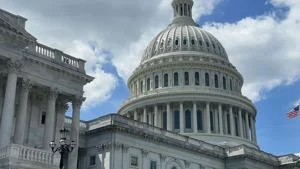As the U.S. House weighs another vote on Republicans’ Rescissions Act of 2025 to cut $9.4 billion in already approved spending, National Public Radio says it receives just 1% of its funding directly from the federal government.
Among the cuts in the rescissions measure passed this week by the U.S. Senate are $8.3 billion in non-lifesaving foreign aid and $1.1 billion meant to fund the Corporation for Public Broadcasting, which finances NPR, PBS and some local radio stations. The Trump administration says public broadcasting systems like PBS and NPR are politically biased toward the left and should not receive taxpayer funding.
An NPR story on itself following the Senate vote said: “Now NPR gets about 1% of its funding directly from the federal government, which also funds the member stations but they get a bigger chunk of their budgets from the federal government through the Corporation for Public Broadcasting.”
But NPR receives millions in additional federal taxpayer dollars indirectly through its relationship with its local affiliates.
“NPR may receive little direct federal funding, but a good deal of its budget comprises federal funds that flow to it indirectly by federal law,” American Enterprise Institute’s Howard Husock wrote.
Under the 1967 Public Broadcasting Act, federal funds are allocated to the Corporation for Public Broadcasting, which distributes most of its budget to local public TV and radio stations through community service grants. These local stations then use those funds to pay NPR to carry its national programs like “Morning Edition” and “All Things Considered.”
In 2021, NPR reported $90 million in revenue from such contracts with stations, which is closer to 30% of total revenue and second only to corporate sponsorships at $121 million.
“When reporting on one’s own media outlet, expert knowledge of the subject is expected. And when that media outlet claims to be non‐partisan, and exists to inform the public, a high standard of news coverage is expected. Which is why it’s especially concerning that NPR leaves out critical information that clearly misstates how much government funding it receives,” Christine Czernejewski, head of MediaPedia.org, a media bias watchdog, said. “NPR appears to be proving its critics right when it comes to reporting bias.”
NPR filed a lawsuit in May challenging President Donald Trump’s executive order to end federal funding of public media, claiming the effort violates the First Amendment and federal law. In announcing the lawsuit, NPR CEO Katherine Maher said that Trump’s order cutting public funding “threatens the existence of the public broadcasting system.”
NPR did not immediately respond to The Center Square’s request for comment.






